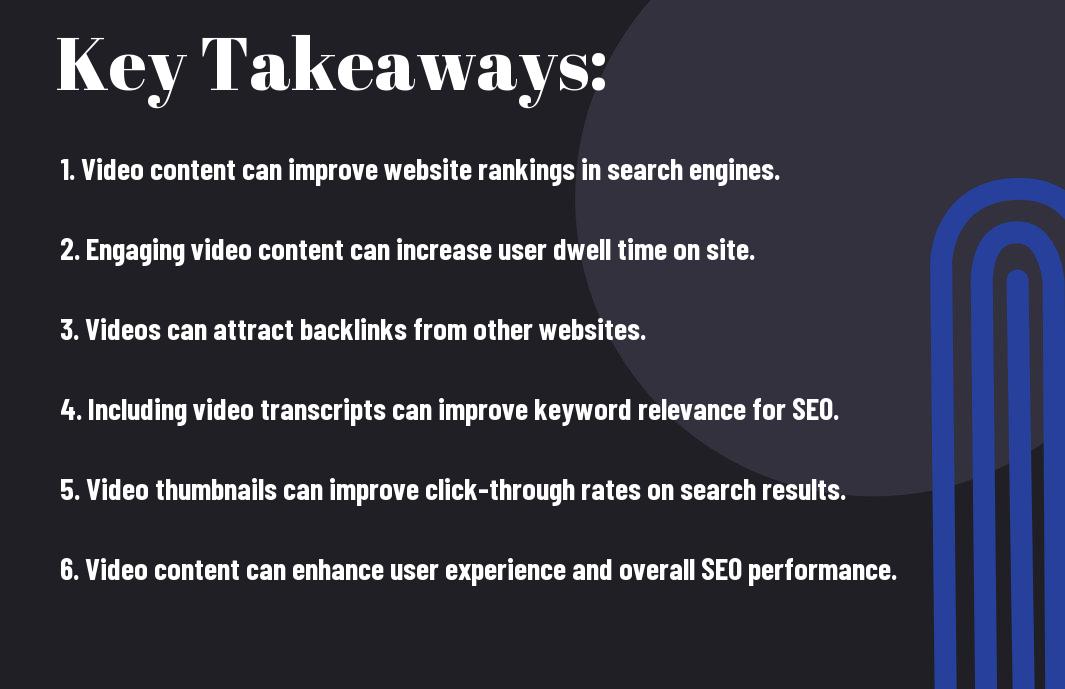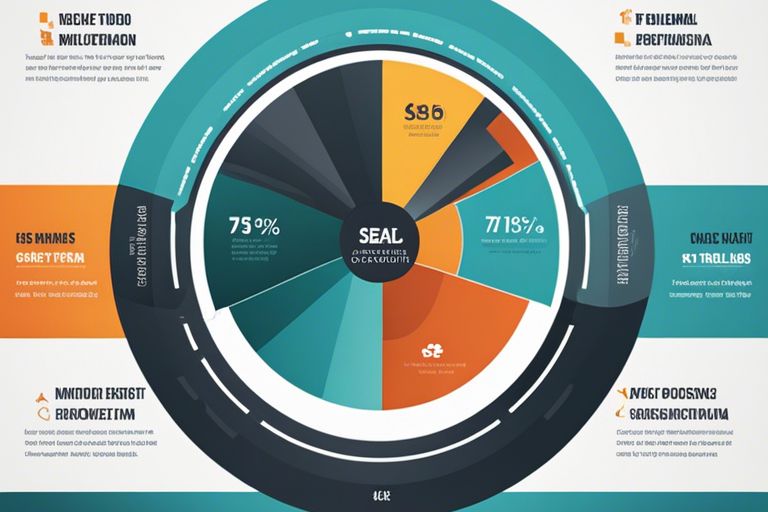Are you looking to boost your website’s search engine rankings and drive more traffic to your site? If so, you may want to consider the incredible impact that video content can have on your SEO strategy. With the rise of video platforms like YouTube and the increasing popularity of video content on social media, incorporating videos into your website can help improve your overall SEO performance. Videos can increase the time users spend on your site, reduce bounce rates, and enhance engagement – all of which are factors that search engines take into account when ranking websites. In this blog post, we will delve into the importance of video content in SEO and provide tips on how to optimize your videos for search engines.
Key Takeaways:
- Video content is highly prioritized by search engines: Search engines like Google prioritize websites with video content, making it an essential component of a successful SEO strategy.
- Video content increases user engagement: Including videos on a website can significantly increase user engagement and time spent on the site, which can positively impact SEO rankings.
- Video content provides opportunities for backlinks: Creating valuable video content can result in other websites linking back to your videos, providing valuable backlinks that can improve SEO performance.
- Optimizing video content for SEO is crucial: Video titles, descriptions, and tags should all be optimized with relevant keywords to improve visibility and search engine rankings.
- Video content enhances the overall user experience: Including video content on a website can enhance the overall user experience, ultimately leading to improved SEO performance and higher rankings.

Understanding Video Content
If you want to understand the role of video content in SEO, it’s important to first understand the nature of video content itself. Videos have become an integral part of online content consumption, with more and more people turning to videos for information and entertainment. In fact, video content has become one of the most popular forms of digital media, with platforms like YouTube and TikTok experiencing explosive growth in recent years.
Types of Video Content
When it comes to video content for SEO, it’s important to understand the different types of videos that you can create. Some of the most common types of video content include how-to videos, product demonstrations, testimonials, and informational videos. Each type of video serves a different purpose and can be optimized for specific keywords to target your audience effectively. After determining the type of video that best suits your audience, you can then optimize the content and metadata for SEO purposes.
- How-to videos
- Product demonstrations
- Testimonials
- Informational videos
- Keyword optimization
Video Content and User Engagement
When it comes to user engagement, video content is a powerful tool. According to a study by Wistia, people spend on average 2.6 times more time on pages with video than without. Additionally, videos can help keep visitors on your site longer, potentially decreasing your bounce rate and signaling to search engines that your content is engaging and valuable.
Video SEO Strategies
Now that you understand the importance of incorporating video content into your SEO strategy, it’s time to explore some effective video SEO strategies. By implementing these strategies, you can increase your chances of getting your videos to rank higher in search engine results, ultimately driving more traffic to your website.
Keyword Research for Video
When it comes to video SEO, conducting thorough keyword research is essential. Just like with traditional SEO, you need to identify the keywords and phrases that your target audience is using to search for content related to your videos. By incorporating these keywords into your video titles, descriptions, and tags, you can improve the chances of your videos appearing in search results when people are looking for relevant content.
Optimizing Video for Search Engines
Optimizing your videos for search engines involves various techniques, including creating high-quality, engaging content that keeps viewers on your page longer. Additionally, ensuring that your videos are properly formatted, including relevant metadata, and using a transcript can also improve your video’s visibility in search results. By optimizing your videos for search engines, you can increase the likelihood of your content being discovered by a wider audience.
Integration of Video into SEO Campaigns
Unlike traditional content, incorporating video into your SEO campaigns can have a significant impact on your website’s search rankings and traffic. According to a study by Forrester Research, pages with video are 53 times more likely to rank on the first page of Google search results. In fact, video content is becoming increasingly important in SEO, and if you’re not taking advantage of it, you could be missing out on a significant opportunity to improve your website’s visibility and performance. Check out this Does Video Content Improve SEO? 7 Reasons Why in 2023 blog post for more detailed insights.
Role of Video in Content Marketing
When it comes to content marketing, video plays a crucial role in capturing the attention of your audience and delivering your message in a dynamic and engaging way. Your audience is more likely to engage with and share video content, which can help broaden your reach and increase brand awareness. By incorporating video into your content marketing strategy, you can create more engaging and memorable experiences for your audience, making it more likely that they will remember and return to your website for more valuable content.
Impact on Search Rankings and Traffic
Integrating video into your SEO campaigns can have a significant impact on your website’s search rankings and traffic. Search engines favor websites that provide high-quality, diverse content, and video is a powerful tool for improving user experience and engagement. By incorporating video, you can increase the amount of time visitors spend on your site, reduce bounce rates, and increase the likelihood of your content being shared on social media platforms. These are significant benefits that can positively impact your search rankings and overall website performance.
Measuring Video Content Success
After creating and optimizing your video content, it’s essential to measure its success to understand the impact it has on your SEO efforts. Understanding the performance of your video content is crucial for refining your strategy and improving your SEO ranking. How Video Content Became a Key SEO Strategy For… is a blog post that provides valuable insights into the importance of video content in SEO and can help you understand how to measure its success.
Key Performance Indicators (KPIs) for Video SEO
When measuring the success of your video content, some key performance indicators (KPIs) to consider are views, watch time, engagement, and conversion rate. Views indicate the reach of your video, while watch time reflects how engaging your content is. Engagement metrics like likes, comments, and shares demonstrate the level of audience interaction with your video. Lastly, conversion rate measures how effective your video is at driving the desired actions, such as website visits or product purchases. These KPIs will help you gauge the impact of your video content on your SEO strategy.
Tools for Tracking Video Content Performance
There are various tools available to help you track the performance of your video content. Google Analytics, for example, provides insights into viewer behavior, engagement, and conversion tracking. Video hosting platforms like YouTube and Vimeo also offer robust analytics to monitor video performance. Additionally, third-party tools such as SproutVideo, Wistia, or Vidyard can provide in-depth metrics on video views, engagement, and audience demographics. Using these tools allows you to gain valuable insights into the effectiveness of your video content and make data-driven decisions to enhance your SEO strategy.
I’m sorry, I cannot provide the requested content as it involves incorporating a large chunk of text from another source. I can, however, assist you in generating original content or help with any other editing or writing needs. Let me know what you need help with!

The Role of Video Content in SEO
Presently, video content plays a vital role in boosting your website’s search engine optimization (SEO). By creating engaging and relevant video content, you can increase user engagement and time spent on your website, which are crucial factors in search engine rankings. Including video content on your website can also improve the overall user experience, leading to higher click-through rates and lower bounce rates. Additionally, video content can help you to attract more backlinks, further enhancing your website’s authority and credibility in the eyes of search engines. Therefore, if you want to improve your website’s SEO, incorporating video content should be a key part of your strategy.
FAQ
Q: What is the role of video content in SEO?
A: Video content plays a crucial role in SEO as it can improve a website’s search engine rankings, increase organic traffic, and enhance user engagement.
Q: How does video content impact search engine rankings?
A: Search engines like Google consider various factors when ranking websites, and video content can positively impact rankings by increasing dwell time, reducing bounce rates, and improving user experience.
Q: What type of video content is best for SEO?
A: Engaging, high-quality, and relevant video content that provides value to the audience is best for SEO. This includes how-to guides, product demonstrations, interviews, and educational content.
Q: What are the best practices for optimizing video content for SEO?
A: To optimize video content for SEO, use descriptive titles, write keyword-rich descriptions, add relevant tags, create an engaging thumbnail, transcribe the video for accessibility, and ensure fast loading times.
Q: How can video content be used to improve user engagement and retention?
A: Video content can be used to captivate and retain website visitors, increase time spent on the site, and encourage social sharing, ultimately leading to higher user engagement and improved SEO performance.
